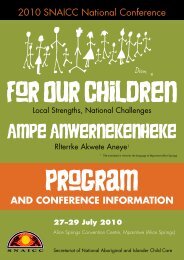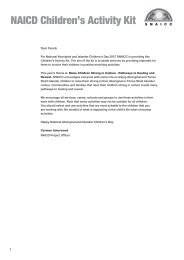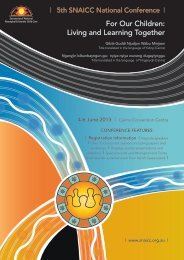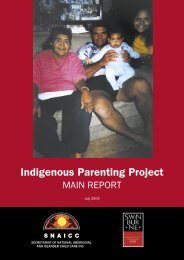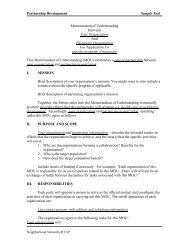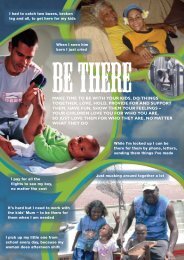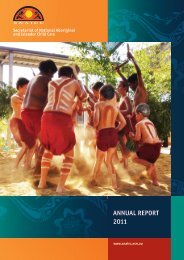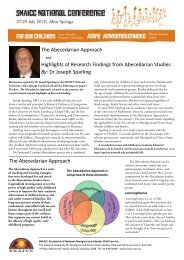Aboriginal and Torres Strait Islander CHILD RIGHTS REPORT CARD
Aboriginal and Torres Strait Islander CHILD RIGHTS REPORT CARD
Aboriginal and Torres Strait Islander CHILD RIGHTS REPORT CARD
Create successful ePaper yourself
Turn your PDF publications into a flip-book with our unique Google optimized e-Paper software.
N ATSILS<br />
<strong>Aboriginal</strong> <strong>and</strong> <strong>Torres</strong> <strong>Strait</strong> Isl<strong>and</strong>er<br />
<strong>CHILD</strong> <strong>RIGHTS</strong> <strong>REPORT</strong> <strong>CARD</strong><br />
What Australia must do to protect <strong>and</strong> support the rights<br />
of <strong>Aboriginal</strong> <strong>and</strong> <strong>Torres</strong> <strong>Strait</strong> Isl<strong>and</strong>er children
Contact Us<br />
The Secretariat of National <strong>Aboriginal</strong> <strong>and</strong> Isl<strong>and</strong>er<br />
Child Care (SNAICC), established in 1981, is the<br />
national peak body in Australia representing the interests<br />
of <strong>Aboriginal</strong> <strong>and</strong> <strong>Torres</strong> <strong>Strait</strong> Isl<strong>and</strong>er children <strong>and</strong> their<br />
families. For more information call 03 9489 8099,<br />
see snaicc.org.au or contact Emma Sydenham<br />
on emma.sydenham@snaicc.org.au.<br />
The National <strong>Aboriginal</strong> <strong>and</strong> <strong>Torres</strong> <strong>Strait</strong> Isl<strong>and</strong>er Legal<br />
Services (NATSILS) is the peak body for <strong>Aboriginal</strong> <strong>and</strong><br />
<strong>Torres</strong> <strong>Strait</strong> Isl<strong>and</strong>er Legal Services (ATSILS) within<br />
Australia. For more information call 07 3025 3888 or<br />
contact Rachel O’Brien at rachel.obrien@atsils.org.au.<br />
Acknowledgements<br />
SNAICC <strong>and</strong> NATSILS acknowledge <strong>and</strong> thank the<br />
Attorney-General’s Department for its support in the<br />
publication of this resource.<br />
We also recognise <strong>and</strong> appreciate the support of:<br />
• Catherine Glavici for the design of the resource;<br />
• Youth at Moree College, Bathurst, for the art work<br />
used in this resource; <strong>and</strong><br />
• Home Makers Centre Play Group, <strong>Aboriginal</strong> Family<br />
Support Services, Coober Pedy, for the photo of Jonny.<br />
SNAICC & NATSILS<br />
www.snaicc.org.au | PH 03 9489 8099
<strong>Aboriginal</strong> <strong>and</strong> <strong>Torres</strong> <strong>Strait</strong> Isl<strong>and</strong>er<br />
<strong>CHILD</strong> <strong>RIGHTS</strong> <strong>REPORT</strong> <strong>CARD</strong><br />
01<br />
What are Human Rights<br />
Everyone has human rights <strong>and</strong> is entitled to have them<br />
respected. These rights reflect the human dignity of all<br />
people. Governments, <strong>and</strong> other actors like companies,<br />
organisations <strong>and</strong> individuals, have obligations to respect<br />
each individuals human rights. The Government, however,<br />
has specific obligations to ensure that:<br />
• it respects these rights;<br />
• it protects them from being violated by anyone<br />
else; <strong>and</strong><br />
• people have the basic conditions <strong>and</strong> supports<br />
to fulfill their rights.<br />
Children’s Rights are specific human rights of each<br />
child, recognising the special position of children <strong>and</strong><br />
their needs.<br />
Are Children’s Rights in International<br />
law<br />
YES.<br />
The rights of the child are primarily contained in the<br />
United Nations Convention on the Rights of the Child.<br />
This is an international agreement that Australia signed<br />
in 1990. This means Australia is bound by the obligations<br />
<strong>and</strong> rights under the Convention.<br />
Are Children’s Rights in Australian law<br />
NO.<br />
Even though Australia signed the Convention on the Rights<br />
of the Child two decades ago it still has not introduced<br />
legislation to protect the rights of children. This means<br />
that the st<strong>and</strong>ards for children’s rights are different in each<br />
State of Australia <strong>and</strong> that some rights in the Convention<br />
are not protected.<br />
Is Australia doing enough to protect<br />
children’s rights<br />
NO.<br />
The Australian Government is not doing enough to protect<br />
the rights of our children <strong>and</strong> this has been recognised by<br />
the International community.<br />
In June 2012, the United Nations Committee on the<br />
Rights of the Child released a report card on how Australia<br />
is performing in its obligations under the Convention.<br />
The Report Card notes significant gaps in the fulfilment<br />
of Australia’s obligations to children’s rights under the<br />
Convention.<br />
Is Australia doing enough to protect<br />
<strong>Aboriginal</strong> <strong>and</strong> <strong>Torres</strong> <strong>Strait</strong> Isl<strong>and</strong>er<br />
children’s rights<br />
NO.<br />
The Australian Government is not doing enough to<br />
protect the rights of <strong>Aboriginal</strong> <strong>and</strong> <strong>Torres</strong> <strong>Strait</strong> Isl<strong>and</strong>er<br />
children. The UN Committee on the Rights of the Child<br />
was very concerned about the “serious <strong>and</strong> widespread<br />
discrimination” that our children face, including in the<br />
lack of available services, barriers to accessing basic<br />
services, <strong>and</strong> the very high numbers of our children<br />
involved in the criminal justice system <strong>and</strong> in<br />
out-of-home care.<br />
What does Australia need to do<br />
The Committee has recommended that the Australian<br />
Government take a series of different actions to better<br />
protect <strong>and</strong> support <strong>Aboriginal</strong> <strong>and</strong> <strong>Torres</strong> <strong>Strait</strong> Isl<strong>and</strong>er<br />
children’s rights, including those set out in this resource.<br />
The Committee stressed the need for <strong>Aboriginal</strong> <strong>and</strong><br />
<strong>Torres</strong> <strong>Strait</strong> Isl<strong>and</strong>er participation in decisions impacting<br />
<strong>Aboriginal</strong> <strong>and</strong> <strong>Torres</strong> <strong>Strait</strong> Isl<strong>and</strong>er children <strong>and</strong> youth.<br />
The Committee also called for long term strategies that<br />
respond to the causes of current disadvantage that too many<br />
<strong>Aboriginal</strong> <strong>and</strong> <strong>Torres</strong> <strong>Strait</strong> Isl<strong>and</strong>er children experience.<br />
Read this resource for more detailed information on what<br />
the Committee said <strong>and</strong> what you can do to help see these<br />
recommendations become a reality!<br />
SNAICC & NATSILS www.snaicc.org.au | PH 03 9489 8099
<strong>Aboriginal</strong> <strong>and</strong> <strong>Torres</strong> <strong>Strait</strong> Isl<strong>and</strong>er<br />
<strong>CHILD</strong> <strong>RIGHTS</strong> <strong>REPORT</strong> <strong>CARD</strong><br />
02<br />
“Our children need our support to make their own way”<br />
Dawn Wallam, SNAICC Chairperson<br />
Right to<br />
detention as<br />
a last resort<br />
Right to<br />
grow up<br />
living culture<br />
Right to<br />
proper<br />
housing<br />
Right to<br />
grow up with<br />
family <strong>and</strong><br />
community<br />
Right to<br />
nutritious food,<br />
clothing <strong>and</strong><br />
basic needs<br />
United Nations<br />
Convention on<br />
the Rights of<br />
the Child<br />
Freedom from<br />
discrimination<br />
Right to have<br />
your say in<br />
decisions that<br />
impact you<br />
Freedom<br />
from family<br />
violence <strong>and</strong><br />
child abuse<br />
Right to<br />
physical <strong>and</strong><br />
mental health<br />
Right to<br />
education, from<br />
early childhood<br />
onwards<br />
“It’s time to take a st<strong>and</strong> for <strong>and</strong> with <strong>Aboriginal</strong><br />
<strong>and</strong> <strong>Torres</strong> <strong>Strait</strong> Isl<strong>and</strong>er children!”<br />
Shane Duffy, NATSILS chairperson<br />
SNAICC & NATSILS<br />
www.snaicc.org.au | PH 03 9489 8099
<strong>Aboriginal</strong> <strong>and</strong> <strong>Torres</strong> <strong>Strait</strong> Isl<strong>and</strong>er<br />
<strong>CHILD</strong> <strong>RIGHTS</strong> <strong>REPORT</strong> <strong>CARD</strong><br />
03<br />
<strong>CHILD</strong> <strong>RIGHTS</strong> <strong>REPORT</strong> <strong>CARD</strong> –<br />
What Australia must do to protect <strong>and</strong> support the rights<br />
of <strong>Aboriginal</strong> <strong>and</strong> <strong>Torres</strong> <strong>Strait</strong> Isl<strong>and</strong>er children<br />
In June 2012, the United Nations (UN) Committee on the Rights of the Child reviewed Australia in relation to its<br />
compliance with the UN Convention on the Rights of the Child. This resource explains the major concerns <strong>and</strong><br />
recommendations made by the Committee about the rights of <strong>Aboriginal</strong> <strong>and</strong> <strong>Torres</strong> <strong>Strait</strong> Isl<strong>and</strong>er children <strong>and</strong> youth.<br />
It also contains information on some ideas of how you as services, organisations, parents <strong>and</strong> communities can take<br />
action to ensure the better protection of, <strong>and</strong> support for, the rights of our children.<br />
What is the UN Convention on the<br />
Rights of the Child<br />
The UN Convention on the Rights of the Child (Convention)<br />
is an international legal agreement that sets out the<br />
basic human rights of all children. While everyone has<br />
the responsibility to respect children’s rights <strong>and</strong> to help<br />
children to realise their rights, the Convention mostly<br />
focuses on what governments must do. It protects children’s<br />
rights by setting minimum st<strong>and</strong>ards across all areas of life,<br />
including health care, education, st<strong>and</strong>ard of living, <strong>and</strong><br />
involvement with the justice system <strong>and</strong> culture.<br />
Almost every country in the world has signed up to this<br />
Convention. Australia signed up in 1990, but has not<br />
made the Convention part of Australian law yet. By<br />
agreeing to the Convention, governments commit to<br />
respect, protect <strong>and</strong> fulfill the rights of children that<br />
the Convention contains.<br />
The Convention can be used together with the UN<br />
Declaration on the Rights of Indigenous Peoples.<br />
This Declaration specifically sets out the human rights<br />
of Indigenous peoples, including children, throughout<br />
the world.<br />
The Committee on the Rights of the Child (Committee)<br />
is a committee set up by the UN <strong>and</strong> is made up of<br />
independent experts who meet in Geneva. The Committee<br />
investigates how each country’s government fulfills its<br />
obligations under the Convention. Countries must report<br />
to the Committee every five years on what they are doing<br />
to ensure the protection of children’s rights.<br />
Australia’s Child Report Card 2012 –<br />
What did it say<br />
In June 2012, the Committee looked at how well the Australian<br />
Government has been protecting the rights of its children.<br />
The Committee was supportive of positive developments<br />
for <strong>Aboriginal</strong> <strong>and</strong> <strong>Torres</strong> <strong>Strait</strong> Isl<strong>and</strong>er children <strong>and</strong><br />
youth. There are many changes happening every day to<br />
empower our children <strong>and</strong> help them to grow up strong<br />
<strong>and</strong> healthy, to live the life they want to lead. In particular,<br />
the Committee welcomed many steps that have been taken<br />
by the Government, including: the National Apology to the<br />
Stolen Generations in 2008; the Closing the Gap strategy<br />
launched in 2008; introduction of various laws; the<br />
development of National Frameworks for the protection of<br />
Australia’s children <strong>and</strong> to reduce violence against women<br />
<strong>and</strong> children; <strong>and</strong> the development of The National Early<br />
Childhood Development Strategy.<br />
The job of the Committee, however, is to focus on what still<br />
needs support, on where there are gaps. The Committee<br />
was really concerned that there are still too many failures<br />
in protecting <strong>and</strong> supporting <strong>Aboriginal</strong> <strong>and</strong> <strong>Torres</strong> <strong>Strait</strong><br />
Isl<strong>and</strong>er children. The Committee was very concerned<br />
about the “serious <strong>and</strong> widespread discrimination” that<br />
our children face, including in the lack of available<br />
services, barriers to accessing basic services, <strong>and</strong> the<br />
very high numbers of our children involved in the criminal<br />
justice system <strong>and</strong> in out-of-home care.<br />
The Committee said that the Australian Government must<br />
do more to meet the needs <strong>and</strong> protect the basic rights of<br />
<strong>Aboriginal</strong> <strong>and</strong> <strong>Torres</strong> <strong>Strait</strong> Isl<strong>and</strong>er children.<br />
SNAICC & NATSILS<br />
www.snaicc.org.au | PH 03 9489 8099
<strong>Aboriginal</strong> <strong>and</strong> <strong>Torres</strong> <strong>Strait</strong> Isl<strong>and</strong>er<br />
<strong>CHILD</strong> <strong>RIGHTS</strong> <strong>REPORT</strong> <strong>CARD</strong><br />
04<br />
What did the Committee focus on<br />
Below is a summary of the Committee’s main concerns<br />
on how Australia is failing to fully protect <strong>and</strong> support our<br />
children <strong>and</strong> the actions the Australian Government should<br />
take to address them.<br />
MAKING THE CONVENTION LAW IN<br />
AUSTRALIA<br />
CONCERNS:<br />
The rights outlined in the Convention are currently not<br />
comprehensively protected within Australian law.<br />
GOVERNMENT ACTION REQUIRED:<br />
The Australian Government needs to pass a comprehensive<br />
Child Rights Act in Australian law that protects all the<br />
rights outlined in the Convention.<br />
EQUAL ACCESS TO SERVICES<br />
CONCERNS:<br />
Basic services are not reaching children.<br />
GOVERNMENT ACTION REQUIRED:<br />
• Identify differences between children’s enjoyment<br />
of their rights;<br />
• Take urgent steps to address barriers in access<br />
to services by our children <strong>and</strong> their families.<br />
T HE NORTHERN TERRITORY<br />
INTERVENTION<br />
PARTICIPATION <br />
OF ABORIGINAL AND<br />
TORRES STRAIT ISLANDER PEOPLES<br />
CONCERNS:<br />
Not enough consultation <strong>and</strong> poor involvement of<br />
our people in policymaking, decision-making <strong>and</strong><br />
implementation of programs affecting our children.<br />
GOVERNMENT ACTION REQUIRED:<br />
• Ensure participation of <strong>Aboriginal</strong> <strong>and</strong> <strong>Torres</strong><br />
<strong>Strait</strong> Isl<strong>and</strong>er people in policymaking, decisionmaking<br />
<strong>and</strong> implementation of programs affecting<br />
children; <strong>and</strong><br />
• Set up an <strong>Aboriginal</strong> <strong>and</strong> <strong>Torres</strong> <strong>Strait</strong> Isl<strong>and</strong>er<br />
leadership group to inform how each ‘Closing<br />
the Gap’ target for child development, well-being<br />
<strong>and</strong> protection are developed, implemented<br />
<strong>and</strong> reviewed.<br />
LEADERSHIP IN MONITORING <strong>RIGHTS</strong><br />
CONCERNS:<br />
The lack of <strong>Aboriginal</strong> <strong>and</strong> <strong>Torres</strong> <strong>Strait</strong> Isl<strong>and</strong>er<br />
representation in tools <strong>and</strong> bodies for monitoring<br />
children’s rights.<br />
GOVERNMENT ACTION REQUIRED:<br />
• Set up a Deputy Commissioner for our children’s<br />
issues at national <strong>and</strong>/or state or territory level;<br />
• Collect information on all areas of children’s rights<br />
so we can identify areas of need.<br />
CONCERNS:<br />
The Northern Territory Intervention punishes groups<br />
of people that are already struggling.<br />
GOVERNMENT ACTION REQUIRED:<br />
Evaluate the Intervention to ensure that measures are<br />
proportionate <strong>and</strong> do not discriminate against <strong>Aboriginal</strong><br />
<strong>and</strong> <strong>Torres</strong> <strong>Strait</strong> Isl<strong>and</strong>er peoples.<br />
SNAICC & NATSILS<br />
www.snaicc.org.au | PH 03 9489 8099
<strong>Aboriginal</strong> <strong>and</strong> <strong>Torres</strong> <strong>Strait</strong> Isl<strong>and</strong>er<br />
<strong>CHILD</strong> <strong>RIGHTS</strong> <strong>REPORT</strong> <strong>CARD</strong><br />
05<br />
THE BEST INTERESTS OF THE <strong>CHILD</strong><br />
CONCERNS:<br />
People don’t know about the principles of the best<br />
interests of the child contained in the convention <strong>and</strong> this<br />
principle is not applied in decisions at all levels, from local<br />
to national.<br />
GOVERNMENT ACTION REQUIRED:<br />
Make sure everyone knows about this principle <strong>and</strong><br />
include it in all policies, programs <strong>and</strong> projects that<br />
affect children.<br />
<strong>CHILD</strong>REN’S PARTICIPATION<br />
CONCERNS:<br />
There are not enough mechanisms that allow <strong>and</strong> support<br />
<strong>Aboriginal</strong> or <strong>Torres</strong> <strong>Strait</strong> Isl<strong>and</strong>er children to participate<br />
in decisions that affect them.<br />
GOVERNMENT ACTION REQUIRED:<br />
Promote participation of children at all levels of<br />
government <strong>and</strong> within the family, community, <strong>and</strong> schools.<br />
In particular the Government must support participation of<br />
vulnerable children.<br />
BIRTH REGISTRATION<br />
CONCERNS:<br />
There are still many obstacles to registering the birth of<br />
children, <strong>and</strong> parents are not aware of how to do it <strong>and</strong><br />
why it is good to do it.<br />
GOVERNMENT ACTION REQUIRED:<br />
• Review of the birth registration processes to ensure<br />
registration of all children at birth;<br />
• Awareness amongst <strong>Aboriginal</strong> <strong>and</strong> <strong>Torres</strong> <strong>Strait</strong><br />
Isl<strong>and</strong>er peoples about the importance of birth<br />
registration;<br />
• Birth certificates provided free of charge;<br />
PRESERVING CULTURAL IDENTITY<br />
CONCERNS:<br />
A large number of <strong>Aboriginal</strong> <strong>and</strong> <strong>Torres</strong> <strong>Strait</strong> Isl<strong>and</strong>er<br />
children are separated from their homes <strong>and</strong> communities<br />
<strong>and</strong> placed into care with familes where there is not<br />
enough support to ensure that they fully live their culture<br />
<strong>and</strong> language.<br />
GOVERNMENT ACTION REQUIRED:<br />
• Review implementation of the Bringing Them<br />
Home Report;<br />
• Take action to make sure there is full respect for<br />
<strong>Aboriginal</strong> <strong>and</strong> <strong>Torres</strong> <strong>Strait</strong> Isl<strong>and</strong>er children’s rights<br />
to their identity, name, culture, language <strong>and</strong> family<br />
relationships throughout the child protection system;<br />
PROTECTING OUR <strong>CHILD</strong>REN FROM<br />
FAMILY VIOLENCE AND <strong>CHILD</strong> ABUSE<br />
CONCERNS:<br />
There are high levels of violence against women <strong>and</strong><br />
children.<br />
GOVERNMENT ACTION REQUIRED:<br />
• Develop laws to reduce violence;<br />
• Adopt a plan of action to address the factors causing<br />
high levels of violence among <strong>Aboriginal</strong> <strong>and</strong> <strong>Torres</strong><br />
<strong>Strait</strong> Isl<strong>and</strong>er women <strong>and</strong> children;<br />
• Prioritise prevention approaches, (including before<br />
birth), to support highly stressed families <strong>and</strong><br />
prevent abuse <strong>and</strong> neglect of children <strong>and</strong> family<br />
violence;<br />
• Conduct a national review of strengths based best<br />
practice in policy <strong>and</strong> programs that prioritise<br />
positive reunification of children at the various<br />
stages of child protection decision-making.<br />
This includes intensive family support services.<br />
• Provide support to people with literacy difficulties.<br />
SNAICC & NATSILS<br />
www.snaicc.org.au | PH 03 9489 8099
<strong>Aboriginal</strong> <strong>and</strong> <strong>Torres</strong> <strong>Strait</strong> Isl<strong>and</strong>er<br />
<strong>CHILD</strong> <strong>RIGHTS</strong> <strong>REPORT</strong> <strong>CARD</strong><br />
06<br />
CONCERNS:<br />
There are inadequate programs to reintegrate child victims<br />
of domestic violence.<br />
GOVERNMENT ACTION REQUIRED:<br />
• Establish ways to ensure effective follow-up support<br />
for child victims upon family reintegration;<br />
• Make a national data collection system to help<br />
underst<strong>and</strong> violence against children.<br />
<strong>CHILD</strong>REN IN OUT OF HOME CARE<br />
CONCERNS:<br />
• Large numbers of <strong>Aboriginal</strong> <strong>and</strong> <strong>Torres</strong> <strong>Strait</strong><br />
Isl<strong>and</strong>er children are placed into out-of-home care<br />
<strong>and</strong> outside their communities;<br />
• Inappropriate placements, a shortage of care options<br />
<strong>and</strong> inadequate training, support <strong>and</strong> assessment<br />
of carers;<br />
• Poorer outcomes for young people in care in relation<br />
to health, education, wellbeing <strong>and</strong> development;<br />
• Abuse <strong>and</strong> neglect in care;<br />
• Inadequate preparation <strong>and</strong> support for children<br />
leaving care.<br />
GOVERNMENT ACTION REQUIRED:<br />
• Examine the root causes of child abuse <strong>and</strong> neglect;<br />
• Provide data on the reasons for placing children in<br />
care;<br />
• Strengthen support to families in vulnerable<br />
situations to prevent or ease abuse <strong>and</strong> neglect<br />
of children.<br />
• Give preference to family-based care;<br />
• Develop criteria for the selection, training <strong>and</strong><br />
support of child-care workers <strong>and</strong> out-of-home<br />
carers, <strong>and</strong> ensure their regular evaluation, <strong>and</strong><br />
increase the no. of social workers;<br />
• Ensure equal access to health care <strong>and</strong> education<br />
for children in care;<br />
• Establish accessible child-friendly mechanisms for<br />
reporting neglect <strong>and</strong> abuse;<br />
• Adequately prepare <strong>and</strong> support young people prior<br />
to them leaving care by early planning of transition<br />
<strong>and</strong> assistance afterwards;<br />
• Fully implement the <strong>Aboriginal</strong> <strong>and</strong> <strong>Torres</strong> <strong>Strait</strong><br />
Isl<strong>and</strong>er Child Placement Principle (repeated<br />
recommendation);<br />
• Cooperate with communities to find suitable<br />
solutions for children in need of alternative care<br />
(repeated recommendation).<br />
HEALTH<br />
CONCERNS:<br />
• The gap in health status between <strong>Aboriginal</strong> <strong>and</strong><br />
<strong>Torres</strong> <strong>Strait</strong> Isl<strong>and</strong>er <strong>and</strong> non-Indigenous children;<br />
• Marked increases in the rates of Sexually<br />
Transmissible Infections (STIs), <strong>and</strong> particularly<br />
high levels for <strong>Aboriginal</strong> <strong>and</strong> <strong>Torres</strong> <strong>Strait</strong> Isl<strong>and</strong>er<br />
peoples, <strong>and</strong> low proportion of youth practicing<br />
safe sex.<br />
GOVERNMENT ACTION REQUIRED:<br />
• Take action to ensure that all children enjoy the<br />
same access to, <strong>and</strong> quality of, health services,<br />
with special attention to <strong>Aboriginal</strong> <strong>and</strong> Torre <strong>Strait</strong><br />
Isl<strong>and</strong>er children <strong>and</strong> children living remotely;<br />
• Take action to overcome poverty;<br />
• Compulsory training in child rights for all health<br />
professionals;<br />
• Provide adolescents with education on sex <strong>and</strong><br />
reproductive health;<br />
• Improve access to contraception, counseling, <strong>and</strong><br />
confidential health services, particularly among<br />
<strong>Aboriginal</strong> <strong>and</strong> <strong>Torres</strong> <strong>Strait</strong> Isl<strong>and</strong>er communities.<br />
SNAICC & NATSILS<br />
www.snaicc.org.au | PH 03 9489 8099
<strong>Aboriginal</strong> <strong>and</strong> <strong>Torres</strong> <strong>Strait</strong> Isl<strong>and</strong>er<br />
<strong>CHILD</strong> <strong>RIGHTS</strong> <strong>REPORT</strong> <strong>CARD</strong><br />
07<br />
<strong>CHILD</strong>REN EXPERIENCING A DISABILITY<br />
CONCERNS:<br />
The current disability support system is under-funded,<br />
unfair, fragmented <strong>and</strong> inefficient, <strong>and</strong> gives people with<br />
a disability little choice <strong>and</strong> no certainty of access to<br />
appropriate supports.<br />
GOVERNMENT ACTION REQUIRED:<br />
• Strengthen support measures for parents to care for<br />
their children with disabilities;<br />
• Address barriers around attitudes that limit<br />
participation of children with disabilities;<br />
• Train all professionals working with, or for, children<br />
with disabilities;<br />
• Make more effort to provide necessary disability<br />
specialists <strong>and</strong> funds at the local level;<br />
• Promote <strong>and</strong> exp<strong>and</strong> community-based rehabilitation<br />
programs, including parent support groups.<br />
MENTAL HEALTH<br />
CONCERNS:<br />
• Funding levels are far below other developed<br />
countries, creating limited access to services;<br />
• Mental health is a leading health issue for children<br />
<strong>and</strong> young people;<br />
• High rate of youth suicide, particularly for the<br />
<strong>Aboriginal</strong> <strong>and</strong> <strong>Torres</strong> <strong>Strait</strong> Isl<strong>and</strong>er community.<br />
GOVERNMENT ACTION REQUIRED:<br />
• Develop measures to address the causes of suicides<br />
<strong>and</strong> other disorders, which are linked to substance<br />
abuse, violence <strong>and</strong> poor care in out of home care;<br />
HOUSING & HOMELESSNESS<br />
CONCERNS:<br />
High child <strong>and</strong> youth homelessness, <strong>and</strong> lack of culturally<br />
appropriate housing services for different groups.<br />
GOVERNMENT ACTION REQUIRED:<br />
• Develop specific strategies for housing for <strong>Aboriginal</strong><br />
<strong>and</strong> <strong>Torres</strong> <strong>Strait</strong> Isl<strong>and</strong>er children;<br />
• Improve support offered by social services to<br />
children at risk of homelessness, including in<br />
relation to education, income support, health,<br />
disability <strong>and</strong> employment.<br />
EDUCATION<br />
CONCERNS:<br />
<strong>Aboriginal</strong> <strong>and</strong> <strong>Torres</strong> <strong>Strait</strong> Isl<strong>and</strong>er children face barriers<br />
in accessing education, <strong>and</strong> have significantly lower rates<br />
of attendance. This means they have lower literacy <strong>and</strong><br />
numeracy than other students.<br />
GOVERNMENT ACTION REQUIRED:<br />
• Develop individual <strong>Aboriginal</strong> <strong>and</strong> <strong>Torres</strong> <strong>Strait</strong><br />
Isl<strong>and</strong>er education strategies based on previous<br />
policy success <strong>and</strong> with a long-term approach<br />
of collaboration with <strong>Aboriginal</strong> <strong>and</strong> <strong>Torres</strong> <strong>Strait</strong><br />
Isl<strong>and</strong>er communities, the education sector,<br />
community organisations <strong>and</strong> professional groups;<br />
• Provide adequate resources (teachers, materials <strong>and</strong><br />
funding) to ensure bilingual models of education are<br />
available, both at national <strong>and</strong> state level;<br />
• Ensure that children with disabilities receive<br />
education, <strong>and</strong> are included with others in<br />
schools to the greatest extent possible.<br />
• Allocate resources for improving the number <strong>and</strong><br />
quality of early intervention services, training <strong>and</strong><br />
development of professionals <strong>and</strong> support to parents;<br />
• Develop specialised health services <strong>and</strong> targeted<br />
strategies for children at particular risk of mental<br />
health problems, <strong>and</strong> their families, <strong>and</strong> ensure<br />
accessibility for all diverse groups.<br />
SNAICC & NATSILS<br />
www.snaicc.org.au | PH 03 9489 8099
<strong>Aboriginal</strong> <strong>and</strong> <strong>Torres</strong> <strong>Strait</strong> Isl<strong>and</strong>er<br />
<strong>CHILD</strong> <strong>RIGHTS</strong> <strong>REPORT</strong> <strong>CARD</strong><br />
08<br />
E ARLY <strong>CHILD</strong>HOOD EDUCATION<br />
AND CARE<br />
CONCERNS:<br />
The quality <strong>and</strong> coverage of care specifically impacting<br />
<strong>Aboriginal</strong> <strong>and</strong> <strong>Torres</strong> <strong>Strait</strong> Isl<strong>and</strong>er children.<br />
GOVERNMENT ACTION REQUIRED:<br />
• Prioritise holistic care for children between<br />
0-3 years old;<br />
• Consider free or affordable care to increase<br />
availability of services for all children;<br />
• Ensure all providers come within the National<br />
Quality Framework.<br />
S UPPORT <strong>CHILD</strong>REN WITH PARENTS IN<br />
PRISON<br />
CONCERNS:<br />
Severe overrepresentation of <strong>Aboriginal</strong> <strong>and</strong> <strong>Torres</strong> <strong>Strait</strong><br />
Isl<strong>and</strong>er peoples in prison, often leaving children in<br />
insecure alternative care, that is not culturally appropriate<br />
<strong>and</strong> with low rates of family reunification.<br />
GOVERNMENT ACTION REQUIRED:<br />
• Implement programs that address the causes<br />
of offending;<br />
• Provide early intervention support services to<br />
families at risk to avoid imprisonment <strong>and</strong><br />
separation from children;<br />
• Where it is in the child’s best interest, resource<br />
<strong>and</strong> support the relationship between parent <strong>and</strong><br />
child while they are in prison.<br />
JUVENILE JUSTICE<br />
CONCERNS:<br />
The over-representation of <strong>Aboriginal</strong> <strong>and</strong> <strong>Torres</strong> <strong>Strait</strong><br />
Isl<strong>and</strong>er children in the criminal justice system <strong>and</strong> the<br />
failure of Australia’s juvenile justice system to meet<br />
international st<strong>and</strong>ards.<br />
GOVERNMENT ACTION REQUIRED:<br />
• The Australian Government has said it does not<br />
have to apply article 37 (c) of the Convention which<br />
requires children to be held separately from adults<br />
while in detention. The Committee said Australia<br />
needs to apply this article to make sure children<br />
are separated in detention <strong>and</strong> in particular, remove<br />
17 year olds from the adult justice system in<br />
Queensl<strong>and</strong>;<br />
• Ensure children <strong>and</strong> youth in detention can write to<br />
<strong>and</strong> be visited by their family;<br />
• Review laws which allow police to remove children<br />
<strong>and</strong> young people gathering in groups peacefully;<br />
• Abolish laws in Western Australia which allows the<br />
publication of personal details of children who carry<br />
out ‘anti-social behaviour’;<br />
• Raise the minimum age of criminal responsibility;<br />
• Respond to children <strong>and</strong> youth who have a mental<br />
illness <strong>and</strong>/or intellectual deficiency who are in<br />
conflict with the law without going through legal<br />
proceedings;<br />
• Abolish m<strong>and</strong>atory sentencing laws that exist in<br />
Australia;<br />
• Create a mechanism that is easy to use for<br />
investigating <strong>and</strong> addressing cases of abuse<br />
at youth detention centres.<br />
SNAICC & NATSILS<br />
www.snaicc.org.au | PH 03 9489 8099
<strong>Aboriginal</strong> <strong>and</strong> <strong>Torres</strong> <strong>Strait</strong> Isl<strong>and</strong>er<br />
<strong>CHILD</strong> <strong>RIGHTS</strong> <strong>REPORT</strong> <strong>CARD</strong><br />
09<br />
What now<br />
This review is one step in a long term process of holding<br />
all Australian Governments accountable for the legal<br />
obligations that they have to respect, protect <strong>and</strong> fulfill the<br />
human rights of all children, including all <strong>Aboriginal</strong> <strong>and</strong><br />
<strong>Torres</strong> <strong>Strait</strong> Isl<strong>and</strong>er children.<br />
How effective these recommendations will be depends on<br />
how we all take responsibility <strong>and</strong> work together. There<br />
are many things that you can do to increase people’s<br />
awareness of these issues <strong>and</strong> increase pressure on<br />
Australian Governments to provide appropriate support<br />
<strong>and</strong> address some of the issues outlined in this resource.<br />
Ideas for action:<br />
• Host information sessions in your community,<br />
service or network of service providers on what the<br />
Committee has said about Australia’s child rights<br />
performance. Discuss what child rights issues are<br />
most important to your community or service <strong>and</strong><br />
how you could do something together to change them.<br />
• Decide on a priority issue in your service or<br />
community, <strong>and</strong> develop a strategy to bring the<br />
recommendations to life.<br />
• Ask your local, state <strong>and</strong> federal government<br />
representatives how they are implementing the<br />
Committee’s recommendations <strong>and</strong> addressing<br />
any concerns important to you.<br />
• Use the Committee’s conclusions <strong>and</strong><br />
recommendations in your submissions, funding<br />
applications or discussions with Government <strong>and</strong><br />
other actors to back up your position on different<br />
issues, <strong>and</strong> seek better support for your children.<br />
• Document different cases where child rights<br />
problems arise in your community to develop an<br />
evidence base for future advocacy projects.<br />
• Set up <strong>and</strong> trial a project that responds to one of the<br />
Committee’s recommendations. Demonstrate that it<br />
works <strong>and</strong> then seek Government funding to exp<strong>and</strong> it.<br />
• Facilitate sessions with children at local schools<br />
on how they see their basic needs <strong>and</strong> what their<br />
priorities are.<br />
• Work with children to develop their own booklets<br />
about their rights, about child rights concerns that<br />
are impacting them <strong>and</strong> about change they want to<br />
see happen. Check out the self-publishing kits on<br />
SNAICC’s website on how to make these books!<br />
• Provide a space for youth leadership <strong>and</strong> support<br />
young people to talk about <strong>and</strong> change issues that<br />
are affecting them.<br />
• Develop ideas on how to better support children’s<br />
participation in issues affecting them in your<br />
community or service.<br />
The Secretariat of National <strong>Aboriginal</strong> <strong>and</strong> Isl<strong>and</strong>er<br />
Child Care (SNAICC) <strong>and</strong> the National <strong>Aboriginal</strong> <strong>and</strong><br />
<strong>Torres</strong> <strong>Strait</strong> Isl<strong>and</strong>er Legal Services (NATSILS) are also<br />
developing some longer term proposals on how to take<br />
these recommendations forward. Get in touch with us <strong>and</strong><br />
become involved. Some of this work will involve:<br />
• Promoting good practice <strong>and</strong> positive changes<br />
happening out there through community action.<br />
• Advocacy to improve laws <strong>and</strong> policies for genuine<br />
<strong>Aboriginal</strong> <strong>and</strong> <strong>Torres</strong> <strong>Strait</strong> Isl<strong>and</strong>er participation in<br />
child protection decision-making.<br />
• Advocacy to improve laws <strong>and</strong> policies that<br />
contribute to the over-representation of <strong>Aboriginal</strong><br />
<strong>and</strong> <strong>Torres</strong> <strong>Strait</strong> Isl<strong>and</strong>er children within the<br />
juvenile justice system.<br />
• Advocacy for accessible, community controlled,<br />
integrated services for our children <strong>and</strong> families,<br />
whether early childhood education <strong>and</strong> care, or child<br />
<strong>and</strong> family support.<br />
• Developing a relationship with the incoming National<br />
Children’s Commissioner to bring awareness <strong>and</strong><br />
attention to important child rights issues.<br />
SNAICC & NATSILS<br />
www.snaicc.org.au | PH 03 9489 8099
Secretariat of National<br />
<strong>Aboriginal</strong> <strong>and</strong> Isl<strong>and</strong>er<br />
Child Care<br />
Suite 8, 252 -260<br />
St Georges Rd,<br />
North Fitzroy VIC 3068<br />
Ph: 03 9489 8099<br />
info@snaicc.org.au<br />
www.snaicc.org.au<br />
NATSILS<br />
The National <strong>Aboriginal</strong><br />
<strong>and</strong> <strong>Torres</strong> <strong>Strait</strong><br />
Isl<strong>and</strong>er Legal Services<br />
Level 5, 183 North Quay,<br />
Brisbane QLD 4000 Australia<br />
Ph: (07) 3025 3888<br />
Fax: (07) 3025 3800<br />
rachel.obrien@atsils.org.au<br />
© Copyright 2012


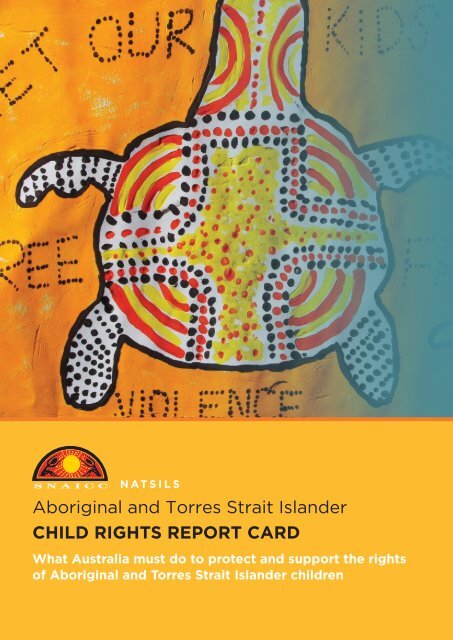
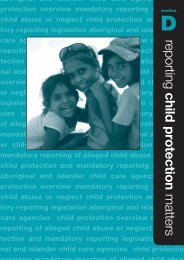
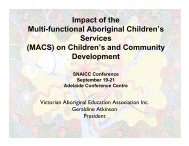
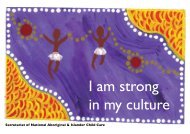
![Kukumbat gudwan daga - really cooking good food. [PDF 716 KB]](https://img.yumpu.com/47617674/1/190x134/kukumbat-gudwan-daga-really-cooking-good-food-pdf-716-kb.jpg?quality=85)
